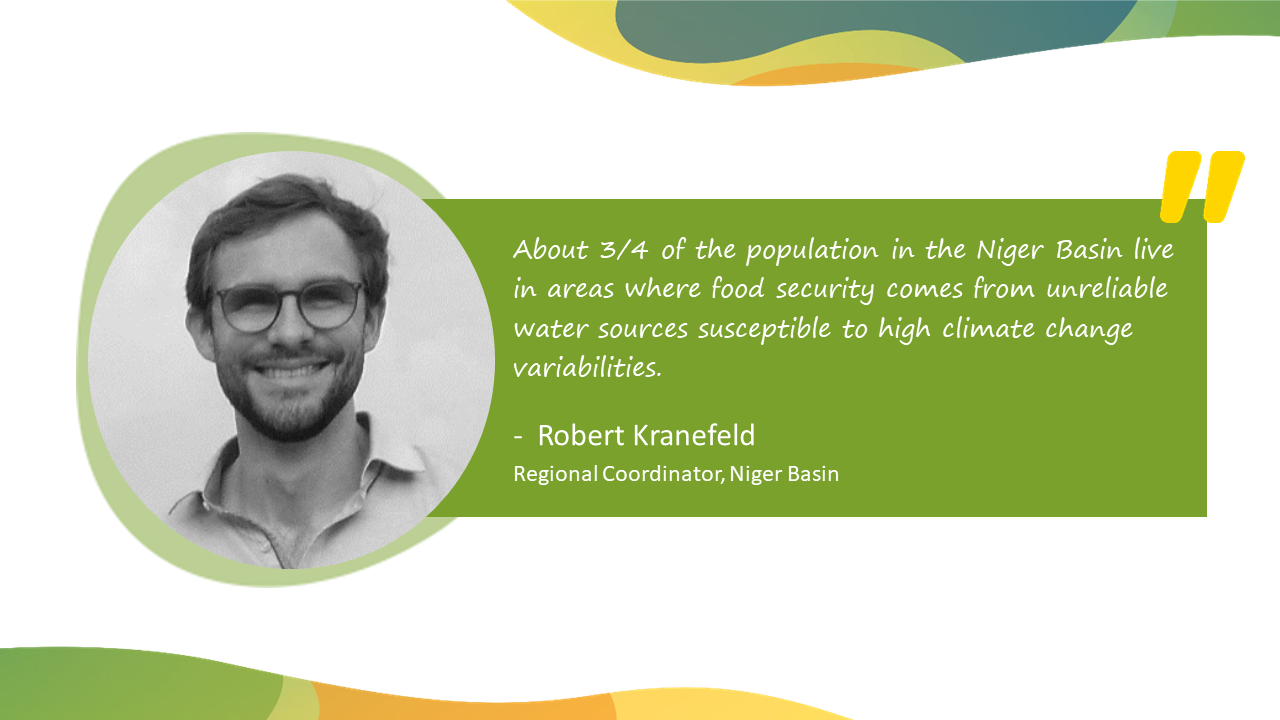Nexus Interview Series // Robert Kranefeld, Regional Coordinator in the Niger Basin
The interview series aims to provide a better picture of the people within the Nexus team and their perspectives on Water Energy Food Nexus challenges and opportunities. In this episode, we invite you to get to know Robert Kranefeld, Regional Coordinator in the Niger Basin.

Robert is the Regional Nexus Coordinator in the Niger Basin in support of the Niger Basin Authority, based in Niamey, Niger. The Basin comprises 9 countries in West Africa and is home to more than 160 million people. Previously, he worked as a political consultant with GIZ to the German Federal Ministry of Economic Cooperation and Development on the topic of water and climate change with a particular focus on climate change adaptation and resilience.
He studied in Germany, France and Canada and holds a M.A. in Geographies of Globalisation from the University of Frankfurt and a B.Sc. in Geography from the University in Münster (both Germany). Robert is fluent in French and English and native in German. His regional focus is East- and particularly West-Africa, while he is based in Cologne, Germany.

What does the WEF Nexus approach mean to you and how would you describe it in your own words?
Water security, energy security and food security are basic human needs and partially even rights. Of course, there are as well many other important conditions with respect to the Sustainable Development Goals. The goals of the WEF-Nexus, however, are linked through a common reference and dependence of the same natural resource base. The sustainable management of ecosystems as well as their preservation and protection are the key to achieving WEF-Nexus security. Having a joint resource base, and having to share resources, can translate into conflicting interests but this need not be the case. The WEF-Nexus approach aims to understand the different sectorial goals without declaring one sector superior, and then integrate the other in its own framework. Mutual understanding can help to find ways to reduce negative impacts and instead create synergies in realising the three Nexus securities. As such, the Nexus approach translates holistic system thinking into practice.
What are the main Nexus challenges in the Niger Basin? Can you mention a specific example?
About three-fourths of the population in the Niger Basin live in areas where food security comes from unreliable water sources susceptible to high climate change variabilities. A large part of the 160 million people living in the basin are actually facing water-energy- and food insecurity at the same time. The basin along with its natural resources such as water but as well soil, flora and fauna are the élan vital of the 160 million people living in the basin. Longer dry periods only interrupted by intense but short rainfall events challenge any annual planning in terms of agricultural production as well as the management of reservoirs. Flash floods are a risk to water security due to the potential contamination of fresh water; having the potential to destroy a full harvest within a few hours and provoke power cuts and destroy vital infrastructure. Increasing storage capacities through nature-based solutions as well as multi-purpose dams can contribute to regulate water flows in the basin and create more stable conditions
What is the most promising approach for implementing/mainstreaming WEF Nexus in the Niger Basin? And why?
The 9 riparian countries of the Niger Basin, namely Benin, Burkina Faso, Cameroun, Chad, Côte d’Ivoire, Guinea, Mali, Niger and Nigeria share a joint understanding of the necessity to manage the basin in a sustainable way. With the founding of the Niger Basin Authority (NBA) in 1980, succeeding the Niger River Commission, the member states defined as overall objective the cooperation based on solidarity and reciprocity for a sustainable, equitable and coordinated use of the basin. This includes the needs of agriculture, livestock rearing, fishing, industry, navigation, mining, energy, tourism, fish farming, transport and communication, forestry and the environment in general. Within the last years, the NBA established a comprehensive strategic framework, such as a joint vision for the development, a water charter with 5 annexes and a joint operational plan and climate investment plan. The coordination between the member states and the NBA is structured through National Focal Structures that consist of several sectorial ministries but as well private and civil society representatives. All these existing organs and frameworks are a good basis to include the WEF-Nexus approach for the development of new projects and to provide guidance how the several sectorial goals can be addressed in synergy.
Thank you Robert for taking the time to answer these questions!
More Information on the Nexus Regional Dialogue in the Niger Basin
- The Nexus Regional Dialogue in the Niger Basin
- The Niger Basin Water Charter
- Key Note by the Executive Secretary of the Niger Basin Authority
- Empowering Women with the Water-Energy-Food (WEF) Nexus Approach in Kollo, Niger
Read more interviews from the series
- Nexus Interview Series // Annah Ndeketeya, Programme Officer, Southern Africa
- Nexus Interview Series // Maria Ana Rodriguez, Head of the Nexus Regional Dialogues Programme
- Nexus Interview Series // Shamiso Kumbirai, SDG Water Investments Officer at Global Water Partnership Southern Africa
- Nexus Interview Series // Ludmilla Kiktenko, Regional Coordinator Central Asia
- Nexus Interview Series // Desire Sengoga, Regional Advisor for the support to the integrated management of water resources of lake Kivu and Ruzizi river
- Nexus Interview Series // Kristine Herbomel, Advisor Support to the integrated management of water resources of lake Kivu and Ruzizi river
- Nexus Interview Series // Irene Sander, Coordinator of the Global Nexus Secretariat
